PRESERVING A MILITARY LEGACY FOR FUTURE GENERATIONS
The following Reflections represents OS1 Chris Walgenbach’s legacy of his military service from 1981 to 1997. If you are a Veteran, consider preserving a record of your own military service, including your memories and photographs, on Togetherweserved.com (TWS), the leading archive of living military history. The following Service Reflections is an easy-to-complete self-interview, located on your TWS Military Service Page, which enables you to remember key people and events from your military service and the impact they made on your life. Start recording your own Military Memories HERE.
Please describe who or what influenced your decision to join the Navy.

Since many in my family were prior military, and specifically, the Navy, I knew that’s what I would do. I would hear my grandfather’s sea stories about WWII in school for Veteran’s Day and listen to my father talk about his time as a Sailor during the Vietnam War. Later I would find out about various uncles (and an aunt or two, no doubt) that had a military career (whether short or long), which further solidified my decision.
My close childhood friends and I would always dream about being a Soldier and even acted the part to an extent (whatever that means). Needless to say, they all joined up as well (a Marine, an Airman, and a Soldier – this sounds like the start of a typical dark-humored military joke.), and to this day, at least one of them is still in the service (albeit the Active Reserves).
I am still on Active Duty, and I’ve enjoyed almost every bit of it. If things go my way, I hope to enjoy the rest of it.
Whether you were in the service for several years or as a career, please describe the direction or path you took. What was your reason for leaving?
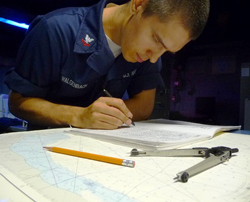
I have not left yet; I hope to make this a career, as long as they will keep me!
Overall, I enjoy being in the Navy, and I love my job as an Operations Specialist. Every Sailor always says their rate is the best, but I genuinely think the OS rating is just that – or at least one of the most unique. Being an OS has offered me a broad spectrum of duties and commands to choose from.
Where some rates are more or less stuck on a specific career path, only able to choose specific commands and tours of duty, I have been lucky to go from one end (of a ship) to the other (the air side of the Navy, to an MTOC) and have been able to complete some very rewarding volunteer-related duties not often offered to other rates, like an Individual Augmentee (IA) to Guantanamo Bay and a Defense POW/MIA Accounting Agency (DPAA) mission in Laos.
If you participated in any military operations, including combat, humanitarian, and peacekeeping operations, please describe those which made a lasting impact on you and, if life-changing, in what way?

There are too many ops I recall that have impacted me, but three stand out just enough from the rest.
To date, the first two impactful operations were my time in Cuba on an Individual Augmentee (IA) and the more recent involvement in Operation Allied Refuge while in Bahrain. For my IA, I was fortunate to work on the detention side of the base in the Camp Ops Center. I managed the coming and going of all detainees, their day-to-day and disciplinary schedules, and overall camp workflow and logistics. What was interesting was seeing all of this from the other side of the glass – keep in mind this is early 2013, and Guantanamo (or GTMO as it was abbreviated) was very much in the media. We always had at least one TV screen on our “TV wall” tuned in to the news, so we had perspective at all times. While the media was reporting based on the info they had (or assumed they had), we had a lot better idea of what everyone (military and detainee alike) was doing inside. It put an interesting spin on my critical thinking and reminded me that even while in the military, I always try to see the bigger picture – and get both sides of a story!
The other operation is more recent and came about pretty suddenly when the end of the Afghan war was declared, and Non-Combatant Operations (NEO) started. I was in Bahrain with a Mobile Tactical Operations Center (MTOC), and we worked hand-in-hand with CTF-57. While our primary tasking was to operate the watch floor supporting continuous flying operations in the 5th Fleet region, we spent most of our off-time helping the evacuees – we helped direct people to appropriate vetting areas after debarkation in Bahrain, loaded and off-loaded baggage. We also helped pass out food and helped disperse toiletries, bedding, and toys as they waited for flights to other stops or final destinations; anyway we could, we did. It was a very humbling experience to be able to make a small, positive impact on the thousands of families that had to flee their country, many with just a suitcase full of personal belongings, leaving everything behind forever. A small part for a big reason, I overheard someone say.
My volunteer time for the Defense POW/MIA Accounting Agency (DPAA) is the one lasting impact that really stands out. I was working at an Explosive Ordnance Disposal (EOD) unit in California, and the agency was looking for an EOD technician for two of their missions. The agency eventually filled the spots from another unit but asked if any other available rates could fill two Non-Commissioned Officer (NCO) spots instead, as the original individuals from their respective units had to bow out last minute. Me and a friend of mine that worked at the same command, a GM2, stepped up.
We were both sent to Hawaii three weeks later for in-processing, various medical screenings and booster shots, a brief on who we were going to be looking for (two Air Force officers who crashed in their F-4D during the Vietnam War), a generic rundown of what we were expected to do for a DPAA mission and finally, our team assignments. We were given a hefty allowance and a large Pelican hard case; told to go to the commissary, stock up on non-perishables and clothing that we wouldn’t care about getting ruined, packed everything up on some Air Force pallets, got onto a C-17, and flew out to Thailand. From there, we made our way by bus all the way up to the North-Eastern border of Laos and Vietnam to a remote village that I couldn’t even point out to you on a map.
My team then spent a few days building up a dig site in a family-owned rice field corner. The rest of the two months consisted of digging down into the ground via a grid system that our civilian Forensic Anthropologist set up. What I found really cool was the variety of military involved; a Marine EOD, an Army communications guy, an Air Force medic – plus the other NCOs (the “diggers”) from all the military branches. We had a civilian doctor, an Army translator, and a retired Navy PJ as our Life Support Equipment Expert (LSE). Every day (except Sundays), we were out there in the searing heat and sun digging buckets of dirt, sending them up to rows of suspended metal sifters hanging from cut bamboo logs, pounding hardened red clay (which we nicknamed “Devil Dirt”) and looked for minute fragments of airplane, clothing, bone – anything that wasn’t dirt or clay. We would play soccer with the village children during breaks and at lunch and converse with the adults and elders (through the two Americans that spoke their language).
At the end of each 10-hour day, we would return by Laos police escort to our guesthouse, meet up at the on-site family-run restaurant and go through our findings for the day. There would be Ziploc bags full of airframe metal, uniform cloth, boot leather, bungee cord, and even the dog tag from one of the officers. The LSE would pick out the smallest fragment of shiny metal or faded dark green cloth and proceed to tell us, in detail, where it was on the plane or on our pilots’ person; following it up with historical picture evidence (a service photo of the pilot or a panoramic picture of the inside of the cockpit of the same kind of plane). Our Forensic Anthropologist would then pick out fragments of bone and explain- however, at this stage of the process, not “conclusively” identify; human versus animal bone or fossilized tree bark and how to tell the difference. The team would then order up a round or two of Beer Lao, praise and poke fun at each other, tell their ‘sea’ stories, and call it a night. Someone had brought a guitar with them, and some nights we’d sing along; others would play Blackjack, and some would have a quiet night of watching movies.
We had a repatriation ceremony since we had found bone, although not yet identified as human or not. I was fortunate to have packed my Service Uniform (a little birdie told me before I even left for Hawaii to pack it just in case), so I was able to be a part of the Repatriation Guard. A handful of Lao dignitaries and U.S. ambassadors came out for the ceremony, and it was even nationally televised on Laos networks. Shortly after that, we packed up, secured the site for future excavation if need be, and flew back to Hawaii for debriefing and more paperwork before going our separate ways back to our respective commands.
A few months later, my Team OIC emailed us the results of some bone fragments – we had been successful in finding our aircraft commander. He was given a burial with full military honors, witnessed by surviving family members. Then two months later, the results were conclusive on more bone fragments – our pilot. He, too, was given a burial with full military honors.
To this day, I still get choked up when I talk about this mission or re-read the news articles. It is such an amazing feeling that I really can’t put it into words – you have to experience it for yourself if you ever get lucky enough. To know that I was part of a small crew of individuals who, through sweat and tears, ripped clothing and scratched hands, sunbaked necks, and achy bones; came together and were able to bring closure to those two families who for 48 years had waited for their service member to come home finally – I will never forget that.
From your entire military service, describe any memories you still reflect on to this day.
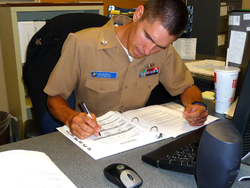
All the deployments I have been on have had some sort of impact on me. I have done a lot of traveling, been stationed at a handful of neat places, and have been to some unique areas, some that most people may not ever get the chance to go to. But it adds up to some incredible experiences, great stories, and quite a career.
Other than the various travel thus far, I would have to say my time at Great Lakes as an instructor at the OS “A” School was pretty impactful. I enjoyed teaching and passing down my knowledge of the rate and the Navy in general to the ‘chucks’ that came through. It was always nice when the class would ask to hear a story about my time in the fleet.
Of all the medals, awards, formal presentations, and qualification badges you received, or other memorabilia, which one is the most meaningful to you and why?
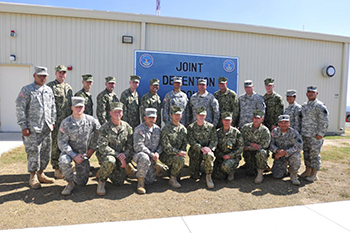
So far, The Army Achievement Medal I got after I went IA to Guantanamo Bay has been the most meaningful. It was the first time I got to work hand in hand with other military branches, and the time I spent in Cuba was one spectacular experience.
Which individual(s) from your time in the military stand out as having the most positive impact on you and why?
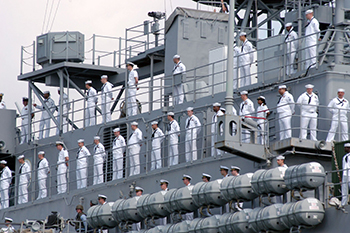
There are a couple of individuals that come to mind. My Leading Petty Officer (LPO) at my first command, USS Nashville, was a great leader. He was strict in the orders he gave and what he expected of us, but he was also down in the muck with his troops when he needed to be. I remember at both times I was up for advancement, he would ask all of us that were eligible, “Did you study today??” and we would unconvincingly give him a “yes, OS1.”; to which he laughed and told us to grab a pub or a MOBOARD. He would then sit down with us and go over a topic or two that was in our bibliographies for the advancement exam or go over multiple MOBOARD problems, explaining how to solve the problem and why it works the way it does. I respect him greatly and attribute my work ethic to him to this day.
The other individual I came across was my LPO, then later the LCPO of the MTOC I was assigned to. She was very stern in her leadership, and although she and I didn’t always see eye to eye with our opposite leadership styles after I took over as LPO, I still respect her. She taught me a different way to look at leading; one that helped me grasp the bigger picture of being an effective leader – to not simply give orders as needed, but to think of others under my command and help guide them when they may or may not know they need it. Looking ahead, planning for multiple situations, and breaking out of my comfort zone sometimes – I still thank her for what she taught me.
What profession did you follow after your military service, and what are you doing now? If you are currently serving, what is your present occupational specialty?
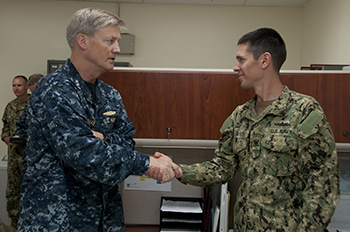
I am still on Active Duty, and I am still an Operations Specialist. I have also been on many command-level teams, such as a Combat Systems Training Team (CSTT) member on a ship; I was a 3-M Work Center Supervisor (WCS) in charge of preventive maintenance for a TacMobile gearset in Iceland. I have been a Key Management Infrastructure (KMI) Lead for cryptography related to radios and IP services, and I am a Navy certified Master Training Specialist.
I currently run programs related to Sailors’ personal finances and the Navy’s drug-testing program, and I’m an equal opportunity program manager. I am also a Level 400 (Instructor qualified) Operations Specialist within the Maritime Patrol and Reconnaissance (MPR) community. I am a Task Group Watch Officer for the Patrol and Reconnaissance command on the west coast.
This is all to say; my specialty is to specialize in my duties (I guess that’s why it’s in the name). I’m not sure where all this will take me once I leave the military, but I like to think whatever direction I take in the next part of my life, the military will have prepared me quite well.
In what ways has serving in the military influenced the way you have approached your life and your career? What do you miss most about your time in the service?
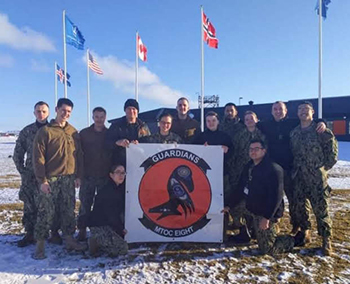
Being in the military for so long has taught me a lot about how to approach life. For starters, you need patience. Everyone knows the “hurry up and wait” motto of the military, and after a couple of years, you almost expect it, so I assume it’s not much of a surprise on the outside when others have their hair up in a bunch, and you’re as calm as a clam.
But just the fact that you get to work with such a diverse mix of people from all areas of the country or the world really says something about how small this planet is. It’s quite the feeling, looking around the mess decks at all walks of life; all there, on the same ship, out in the middle of the ocean, doing a job. It puts some perspective on everything.
Based on your own experiences, what advice would you give to those who have recently joined the Navy?
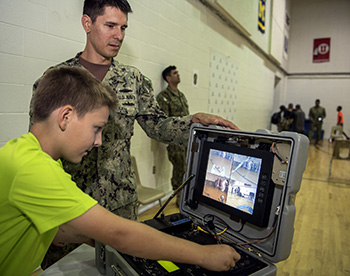
There is a great article I clipped from the Navy Times some years back. A 42-year old veteran gave a few bullets about career advice, and I bring it with me and pin it up in my workspace wherever I go:
-Have a sense of purpose
-Follow your dreams to the point of realizing the benefits of the end result
-Focus on Honor, Courage, and Commitment
-Research opportunities while focusing on career advancement potential
-Always strive to exceed the standards
-Take care of your health, fitness, and spiritual well-being
This advice is good for the E1 to the O10 and can serve as a foundation even after leaving the military.
In what ways has TogetherWeServed.com helped you remember your military service and the friends you served with.
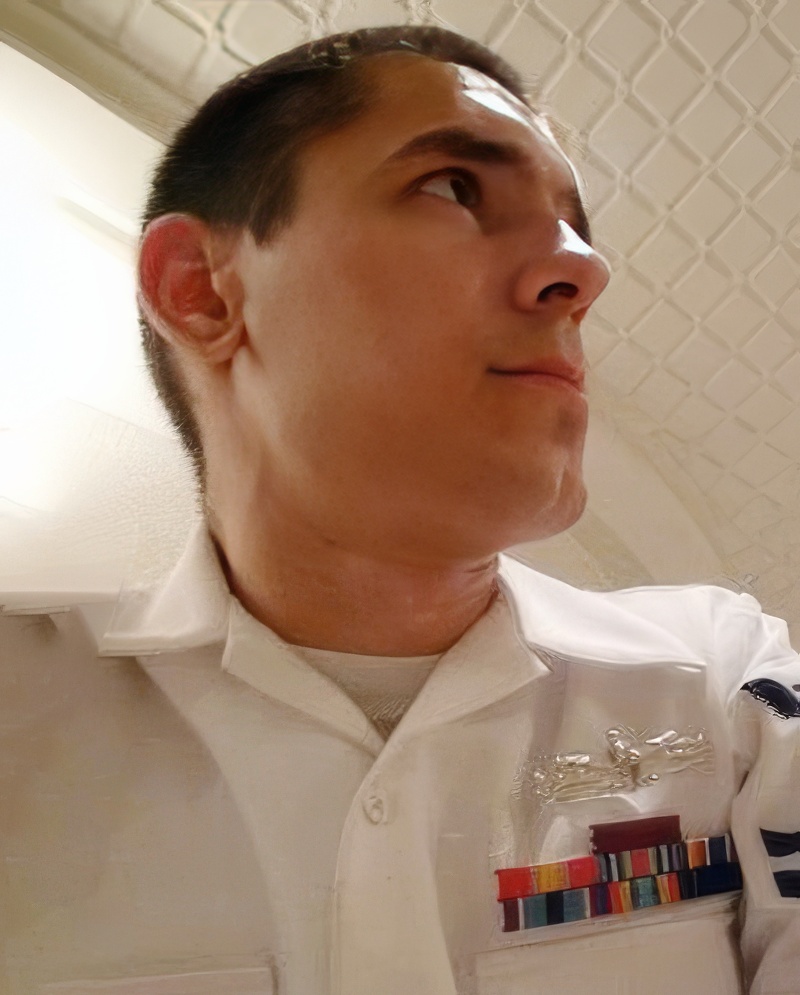
TWS is a great site to honor those on active duty, reserves, vets, and the fallen. I really enjoy reading other Sailors’ bios and browsing through the commands; they’ve been at awards they have received. It brings people together, and just like the mess decks on a ship or the courtyard at a barracks, TWS is a special spot to swap sea stories and boast about oneself.
PRESERVE YOUR OWN SERVICE MEMORIES!
Boot Camp, Units, Combat Operations
Join Togetherweserved.com to Create a Legacy of Your Service
U.S. Marine Corps, U.S. Navy, U.S. Air Force, U.S. Army, U.S. Coast Guard

0 Comments